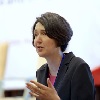| 7:45 - 8:35 am |
Breakfast & Registration
|
| 8:35 - 8:45 am |
Opening Remarks
-
Maurice Obstfeld, International Monetary Fund
-
 Maurice Obstfeld was born in New York City in 1952. Since September 2015, he has been the Economic Counsellor and Director of Research at the International Monetary Fund, on leave from the University of California, Berkeley. At Berkeley, he is the Class of 1958 Professor of Economics and formerly Chair of the Department of Economics (1998-2001). He arrived at Berkeley in 1991 as a professor, following permanent appointments at Columbia (1979-1986) and the University of Pennsylvania (1986-1989), and a visiting appointment at Harvard (1989-90). He received his Ph.D. in economics from MIT in 1979 after attending the University of Pennsylvania (B.A., 1973) and King’s College, Cambridge University (M.A., 1975). From July 2014 to August 2015, Dr. Obstfeld served as a Member of President Obama’s Council of Economic Advisers. He was previously (2002-2014) an honorary advisor to the Bank of Japan's Institute of Monetary and Economic Studies. He is a Fellow of the Econometric Society and the American Academy of Arts and Sciences. Among Dr. Obstfeld's honors are Tilburg University’s Tjalling Koopmans Asset Award, the John von Neumann Award of the Rajk Laszlo College of Advanced Studies (Budapest), and the Kiel Institute’s Bernhard Harms Prize. He has given a number distinguished lectures, including the American Economic Association’s annual Richard T. Ely Lecture, the L. K. Jha Memorial Lecture of the Reserve Bank of India, and the Frank Graham Memorial Lecture at Princeton. Dr. Obstfeld has served both on the Executive Committee and as Vice President of the American Economic Association. He has consulted and taught at the IMF and numerous central banks around the world. He is also the co-author of two leading textbooks on international economics, International Economics (10th edition, 2014, with Paul Krugman and Marc Melitz) and Foundations of International Macroeconomics (1996, with Kenneth Rogoff), as well as more than 100 research articles on exchange rates, international financial crises, global capital markets, and monetary policy. Maurice Obstfeld was born in New York City in 1952. Since September 2015, he has been the Economic Counsellor and Director of Research at the International Monetary Fund, on leave from the University of California, Berkeley. At Berkeley, he is the Class of 1958 Professor of Economics and formerly Chair of the Department of Economics (1998-2001). He arrived at Berkeley in 1991 as a professor, following permanent appointments at Columbia (1979-1986) and the University of Pennsylvania (1986-1989), and a visiting appointment at Harvard (1989-90). He received his Ph.D. in economics from MIT in 1979 after attending the University of Pennsylvania (B.A., 1973) and King’s College, Cambridge University (M.A., 1975). From July 2014 to August 2015, Dr. Obstfeld served as a Member of President Obama’s Council of Economic Advisers. He was previously (2002-2014) an honorary advisor to the Bank of Japan's Institute of Monetary and Economic Studies. He is a Fellow of the Econometric Society and the American Academy of Arts and Sciences. Among Dr. Obstfeld's honors are Tilburg University’s Tjalling Koopmans Asset Award, the John von Neumann Award of the Rajk Laszlo College of Advanced Studies (Budapest), and the Kiel Institute’s Bernhard Harms Prize. He has given a number distinguished lectures, including the American Economic Association’s annual Richard T. Ely Lecture, the L. K. Jha Memorial Lecture of the Reserve Bank of India, and the Frank Graham Memorial Lecture at Princeton. Dr. Obstfeld has served both on the Executive Committee and as Vice President of the American Economic Association. He has consulted and taught at the IMF and numerous central banks around the world. He is also the co-author of two leading textbooks on international economics, International Economics (10th edition, 2014, with Paul Krugman and Marc Melitz) and Foundations of International Macroeconomics (1996, with Kenneth Rogoff), as well as more than 100 research articles on exchange rates, international financial crises, global capital markets, and monetary policy.
|
| 8:45 - 10:45 am |
SESSION 1 - ACCESS TO AND USE OF CREDIT
-
Chair: Martin Cihak, International Monetary Fund
-
 Martin Čihák is a Division Chief in the International Monetary Fund. His work has covered a range of topics such as financial deepening, financial inclusion, stress testing, financial stability assessments, financial sector regulation, the role of the state in finance, and the analysis of global capital markets. Mr. Čihák has covered these topics in a range of articles and publications as well as in numerous IMF missions. Between 2011 and 2013, he was at the World Bank Group as team leader for the Global Financial Development Report. Before joining the IMF in 2000, Mr. Čihák was a chief analyst in a commercial bank, a university lecturer, and a government advisor. He has a PhD in economics and MAs in both economics and law. Martin Čihák is a Division Chief in the International Monetary Fund. His work has covered a range of topics such as financial deepening, financial inclusion, stress testing, financial stability assessments, financial sector regulation, the role of the state in finance, and the analysis of global capital markets. Mr. Čihák has covered these topics in a range of articles and publications as well as in numerous IMF missions. Between 2011 and 2013, he was at the World Bank Group as team leader for the Global Financial Development Report. Before joining the IMF in 2000, Mr. Čihák was a chief analyst in a commercial bank, a university lecturer, and a government advisor. He has a PhD in economics and MAs in both economics and law.
- Do Credit Constraints Limit Entrepreneurship: Heterogeneity in the Returns to Microfinance (Abhijit Banerjee, Emily Breza, Esther Duflo, and Cynthia Kinnan)
-
 Cynthia Kinnan is an assistant professor of economics at Northwestern University. Her research focuses on how households and small firms in developing countries use financial products (e.g., credit, insurance, savings) and informal networks to finance investment, save, and cope with risk. She is particularly interested in the causes of missing markets, in the interaction between risk and household investment, in social networks, and in microfinance. She is a faculty research fellow at the National Bureau of Economic Research (NBER), an affiliate of the Jameel Poverty Action Lab (JPAL) and the Bureau for Research and Economic Analysis of Development (BREAD), and a faculty fellow of the Institute for Policy Research at Northwestern. She holds a PhD in economics from MIT. Cynthia Kinnan is an assistant professor of economics at Northwestern University. Her research focuses on how households and small firms in developing countries use financial products (e.g., credit, insurance, savings) and informal networks to finance investment, save, and cope with risk. She is particularly interested in the causes of missing markets, in the interaction between risk and household investment, in social networks, and in microfinance. She is a faculty research fellow at the National Bureau of Economic Research (NBER), an affiliate of the Jameel Poverty Action Lab (JPAL) and the Bureau for Research and Economic Analysis of Development (BREAD), and a faculty fellow of the Institute for Policy Research at Northwestern. She holds a PhD in economics from MIT.
-
Discussant: Bilal Zia, World Bank
-
 Bilal Zia is a Senior Economist in the Finance and Private Sector Development Team of the World Bank's Development Research Group. His research is focused on financial development at the household, firm, and bank levels, and his work has appeared in top academic journals in economics and finance. He uses both experimental and non-experimental methods and some of his recent work includes rigorous impact evaluations of financial literacy programs, testing innovative methods to improve financial access for households and firms, and applying insights from behavioral economics to development finance. Bilal Zia is a Senior Economist in the Finance and Private Sector Development Team of the World Bank's Development Research Group. His research is focused on financial development at the household, firm, and bank levels, and his work has appeared in top academic journals in economics and finance. He uses both experimental and non-experimental methods and some of his recent work includes rigorous impact evaluations of financial literacy programs, testing innovative methods to improve financial access for households and firms, and applying insights from behavioral economics to development finance.
- To Borrow or Not to Borrow: Religious Norms and the Elasticity of Demand for Credit (Dean Karlan, Adam Osman, and Nour Shammout)
-
 Adam Osman is an Assistant Professor of Economics at the University of Illinois at Urbana-Champaign. His research centers on issues of youth employment and market access with a special emphasis on issues that affect the Middle East and North Africa (MENA) region. Much of his work utilizes randomized evaluations alongside careful data collection and insights from economics to rigorously test theories about how to improve the lives of the poor. He is currently working on projects that deal with issues including job training, Islamic finance, access to capital, and decreasing barriers to trade. Adam earned his PhD in economics from Yale University in 2014 and is the Co-Chair of J-PAL's MENA Research and Policy Initiative. Adam Osman is an Assistant Professor of Economics at the University of Illinois at Urbana-Champaign. His research centers on issues of youth employment and market access with a special emphasis on issues that affect the Middle East and North Africa (MENA) region. Much of his work utilizes randomized evaluations alongside careful data collection and insights from economics to rigorously test theories about how to improve the lives of the poor. He is currently working on projects that deal with issues including job training, Islamic finance, access to capital, and decreasing barriers to trade. Adam earned his PhD in economics from Yale University in 2014 and is the Co-Chair of J-PAL's MENA Research and Policy Initiative.
-
-
Discussant: David McKenzie, World Bank
-
 David McKenzie is a Lead Economist in the Development Research Group, Finance and Private Sector Development Unit. Prior to joining the World Bank, he spent four years as an assistant professor of Economics at Stanford University. His main research is on migration, enterprise development, and methodology for use with developing country data. He has published more than 100 articles, and is currently on the editorial boards of the Journal of Development Economics, the World Bank Economic Review, and Migration Studies. He is also a co-founder and regular contributor to the Development Impact blog. David McKenzie is a Lead Economist in the Development Research Group, Finance and Private Sector Development Unit. Prior to joining the World Bank, he spent four years as an assistant professor of Economics at Stanford University. His main research is on migration, enterprise development, and methodology for use with developing country data. He has published more than 100 articles, and is currently on the editorial boards of the Journal of Development Economics, the World Bank Economic Review, and Migration Studies. He is also a co-founder and regular contributor to the Development Impact blog.
- Endowment Effects and Usage of Financial Products: Evidence from Malawi (Xavier Gine, and Jessica Goldberg)
-
 Jessica Goldberg is an Assistant Professor of Economics at the University of Maryland, an Affiliate of the Abdul Latif Jameel Poverty Action Lab and the Bureau for Research on Economics and Development, and a Non Resident Fellow at the Center for Global Development. Her research focuses on financial inclusion and social protection, with a regional emphasis on East Africa and additional work in India and Bangladesh. She has collaborated with NGOs, private sector partners, and government agencies to collect randomized controlled trials to understand the effect of market failures and behavioral biases on savings, investment, labor supply, and demand for health care, and to measure the impact of interventions designed to alleviate these constraints. Dr. Goldberg holds a PhD in Economics and Public Policy from the University of Michigan, an MPA from Princeton University, and BA in economics and political science from Stanford University. Jessica Goldberg is an Assistant Professor of Economics at the University of Maryland, an Affiliate of the Abdul Latif Jameel Poverty Action Lab and the Bureau for Research on Economics and Development, and a Non Resident Fellow at the Center for Global Development. Her research focuses on financial inclusion and social protection, with a regional emphasis on East Africa and additional work in India and Bangladesh. She has collaborated with NGOs, private sector partners, and government agencies to collect randomized controlled trials to understand the effect of market failures and behavioral biases on savings, investment, labor supply, and demand for health care, and to measure the impact of interventions designed to alleviate these constraints. Dr. Goldberg holds a PhD in Economics and Public Policy from the University of Michigan, an MPA from Princeton University, and BA in economics and political science from Stanford University.
-
Discussant: Maria Soledad Martinez Peria, International Monetary Fund
-
 Maria Soledad (Sole) Martinez Peria is the Division Chief of the Macro-Financial Division in the IMF Research Department. She holds this position on external leave from the Development Research Group of TheWorld Bank. In her current role at the IMF, Sole manages a team of economists responsible for conducting research on macroeconomic and financial issues critical to Fund surveillance activities, with a focus on macro-financial linkages, financial flows, and financial systems. Sole’s published work has focused on access to finance, banking financing for SMEs, currency and banking crises, depositor market discipline, financial inclusion, foreign bank participation in developing countries, the impact of remittances on financial development and the spread of the Global Financial Crisis. Sole has also worked at the Brookings Institution, the Central Bank of Argentina, and the Federal Reserve Board. She holds a PhD in economics from the University of California, Berkeley and a BA from Stanford University. Maria Soledad (Sole) Martinez Peria is the Division Chief of the Macro-Financial Division in the IMF Research Department. She holds this position on external leave from the Development Research Group of TheWorld Bank. In her current role at the IMF, Sole manages a team of economists responsible for conducting research on macroeconomic and financial issues critical to Fund surveillance activities, with a focus on macro-financial linkages, financial flows, and financial systems. Sole’s published work has focused on access to finance, banking financing for SMEs, currency and banking crises, depositor market discipline, financial inclusion, foreign bank participation in developing countries, the impact of remittances on financial development and the spread of the Global Financial Crisis. Sole has also worked at the Brookings Institution, the Central Bank of Argentina, and the Federal Reserve Board. She holds a PhD in economics from the University of California, Berkeley and a BA from Stanford University.
|
| 10:45 - 11:15 am |
Coffee Break
|
| 11:15 - 1:15 pm |
SESSION 2 - ACCESS TO AND USE OF BANK ACCOUNTS
-
Chair: Giovanni Dell’Ariccia, International Monetary Fund
-
 Giovanni Dell'Ariccia is Deputy Director of the Research Department where he supervises the activities of the Macro-Financial Division. Previously he worked in the Asia and Pacific Department. His research interests include: Banking; the Macroeconomics of Credit; Monetary Policy; International Finance; and Conditionality in International Lending and Aid Programs. His papers have been published on major economics and finance journals. Mr. Dell’Ariccia holds a Ph.D. from MIT and a Bachelor degree from the University of Rome. He is a CEPR Research Fellow. Giovanni Dell'Ariccia is Deputy Director of the Research Department where he supervises the activities of the Macro-Financial Division. Previously he worked in the Asia and Pacific Department. His research interests include: Banking; the Macroeconomics of Credit; Monetary Policy; International Finance; and Conditionality in International Lending and Aid Programs. His papers have been published on major economics and finance journals. Mr. Dell’Ariccia holds a Ph.D. from MIT and a Bachelor degree from the University of Rome. He is a CEPR Research Fellow.
- Banking the Unbanked: What do 225 Million New Bank Accounts Reveal about Financial Access? (Sumit Agarwal, Shashwat Alok, Pulak Ghosh, Soumya Ghosh, Tomasz Piskorski, and Amit Seru)
-
 Sumit Agarwal is William G. Droms Term Professor of Finance at the McDonough School of Business and a Professor of Economics (courtesy appointment) at Georgetown University. Previously, he was the Vice-Dean of Research and the Low Tuck Kwong Professor at the School of Business and a Professor in the departments of Economics, Finance and Real Estate at the National University of Singapore. He is also a Research Associate at Research Associate, Institute of Real Estate Studies, Center for Quantitative Finance, Center for Behavioural Economics, and Risk Management Institute. Before that he was a senior financial economist in the research department at the Federal Reserve Bank of Chicago and a senior vice president and credit risk management executive in the Small Business Risk Solutions Group of Bank of America. Sumit’s research interests include issues relating to financial institutions, household finance, behavioral finance, international finance, real estate markets and capital markets. Sumit Agarwal is William G. Droms Term Professor of Finance at the McDonough School of Business and a Professor of Economics (courtesy appointment) at Georgetown University. Previously, he was the Vice-Dean of Research and the Low Tuck Kwong Professor at the School of Business and a Professor in the departments of Economics, Finance and Real Estate at the National University of Singapore. He is also a Research Associate at Research Associate, Institute of Real Estate Studies, Center for Quantitative Finance, Center for Behavioural Economics, and Risk Management Institute. Before that he was a senior financial economist in the research department at the Federal Reserve Bank of Chicago and a senior vice president and credit risk management executive in the Small Business Risk Solutions Group of Bank of America. Sumit’s research interests include issues relating to financial institutions, household finance, behavioral finance, international finance, real estate markets and capital markets.
-
Discussant: Rohini Pande, Harvard Kennedy School
-
 Rohini Pande is an economist whose research examines the economic costs and benefits of informal and formal institutions in the developing world and the role of public policy in affecting change.
Pande is the Rafik Hariri Professor of International Political Economy at Harvard Kennedy School. She co-directs the Evidence for Policy Design (EPoD) Initiative. Her work has examined how institutions - ranging from electoral to financial - can be designed to empower historically disadvantaged groups; how low-cost improvements in information collection and dissemination can enable flexible regulation and more efficient outcomes in areas as diverse as environmental protection and elections; and how biased social norms, unless challenged by public policy, can worsen individual well-being and reduce economic efficiency. Rohini Pande is an economist whose research examines the economic costs and benefits of informal and formal institutions in the developing world and the role of public policy in affecting change.
Pande is the Rafik Hariri Professor of International Political Economy at Harvard Kennedy School. She co-directs the Evidence for Policy Design (EPoD) Initiative. Her work has examined how institutions - ranging from electoral to financial - can be designed to empower historically disadvantaged groups; how low-cost improvements in information collection and dissemination can enable flexible regulation and more efficient outcomes in areas as diverse as environmental protection and elections; and how biased social norms, unless challenged by public policy, can worsen individual well-being and reduce economic efficiency.
- Bank-Branch Supply, Financial Inclusion and Wealth Accumulation (Claire Célérier, and Adrien Matray)
-
 Claire Célérier is an Assistant Professor of Finance at Rotman. Claire holds a Ph.D. in finance from Toulouse School of Economics, a M.Sc. in Economics from Paris School of Economics and a M.Sc. in management from HEC Paris. Claire's research interests include household finance, financial innovation, and banking. In her research, Claire investigates how access to financial products - including innovative structured products but also basic bank accounts or health insurance - can affect household portfolio choice and wealth accumulation. Her work has been published in refereed academic journals, including the Quarterly Journal of Economics, and has raised the interest of several central banks and regulators. Claire is also a member of BEAR "Behavioural Economics in Action at Rotman", and AFFECT "Academic Female Finance Committee". Claire Célérier is an Assistant Professor of Finance at Rotman. Claire holds a Ph.D. in finance from Toulouse School of Economics, a M.Sc. in Economics from Paris School of Economics and a M.Sc. in management from HEC Paris. Claire's research interests include household finance, financial innovation, and banking. In her research, Claire investigates how access to financial products - including innovative structured products but also basic bank accounts or health insurance - can affect household portfolio choice and wealth accumulation. Her work has been published in refereed academic journals, including the Quarterly Journal of Economics, and has raised the interest of several central banks and regulators. Claire is also a member of BEAR "Behavioural Economics in Action at Rotman", and AFFECT "Academic Female Finance Committee".
-
Discussant: Jacopo Ponticelli, Northwestern University
-
 Jacopo Ponticelli joined Kellogg School of Management in 2017 as Associate Professor of Finance. He is an applied economist that primarily studies corporate finance and development economics. His research interests include law and finance, financial development, and economic growth. His work has been published in the American Economic Review and the Quarterly Journal of Economics. Before joining Kellogg School of Management, he served as an Assistant Professor of Finance and Cohen and Keenoy Scholar at the University of Chicago Booth School of Business. Professor Ponticelli holds a PhD in Economics from the Universitat Pompeu Fabra (Spain) and a BA from the Catholic University of Milan (Italy). Jacopo Ponticelli joined Kellogg School of Management in 2017 as Associate Professor of Finance. He is an applied economist that primarily studies corporate finance and development economics. His research interests include law and finance, financial development, and economic growth. His work has been published in the American Economic Review and the Quarterly Journal of Economics. Before joining Kellogg School of Management, he served as an Assistant Professor of Finance and Cohen and Keenoy Scholar at the University of Chicago Booth School of Business. Professor Ponticelli holds a PhD in Economics from the Universitat Pompeu Fabra (Spain) and a BA from the Catholic University of Milan (Italy).
- Financial Access Under the Microscope (Sumit Agarwal, Thomas Kigabo, Camelia Minoiu, Andrea Presbitero, and Andre Silva)
-
 Andrea F. Presbitero (PhD Università Politecnica delle Marche, MA University of Sussex) is Economist at the Research Department of the International Monetary Fund (IMF). Before joining the IMF, he was Assistant Professor at the Università Politecnica delle Marche (Italy) between 2007 and 2013. He has served as a consultant for the World Bank, the Inter-American Development Bank and the IMF on debt sustainability and growth issues. He has published extensively in peer-reviewed international journals, including the Review of Financial Studies, Review of Finance, Journal of International Economics, Journal of Development Economics, IMF Economic Review and Journal of Money, Credit and Banking on financial intermediation, development economics, and international policy. He is Associate Editor of Economia (LACEA). Andrea F. Presbitero (PhD Università Politecnica delle Marche, MA University of Sussex) is Economist at the Research Department of the International Monetary Fund (IMF). Before joining the IMF, he was Assistant Professor at the Università Politecnica delle Marche (Italy) between 2007 and 2013. He has served as a consultant for the World Bank, the Inter-American Development Bank and the IMF on debt sustainability and growth issues. He has published extensively in peer-reviewed international journals, including the Review of Financial Studies, Review of Finance, Journal of International Economics, Journal of Development Economics, IMF Economic Review and Journal of Money, Credit and Banking on financial intermediation, development economics, and international policy. He is Associate Editor of Economia (LACEA).
-
Discussant: Miriam Bruhn, World Bank
-
 Miriam Bruhn is a Senior Economist in the Finance and Private Sector Development Team of the Development Research Group. She joined the Bank as a Young Economist in September 2007. Her research interests include the effect of regulatory reform on entrepreneurial activity, the informal sector, micro and small enterprises, financial literacy, and the relationship between institutions and economic development. She holds a Ph.D. in Economics from MIT and a B.A. in Economics from Yale University. Miriam Bruhn is a Senior Economist in the Finance and Private Sector Development Team of the Development Research Group. She joined the Bank as a Young Economist in September 2007. Her research interests include the effect of regulatory reform on entrepreneurial activity, the informal sector, micro and small enterprises, financial literacy, and the relationship between institutions and economic development. She holds a Ph.D. in Economics from MIT and a B.A. in Economics from Yale University.
|
| 1:15 - 2:30 pm |
Lunch |
| 2:30 - 4:30 pm |
SESSION 3 – ACCESS TO AND USE OF PAYMENT SERVICES
-
Chair: Thorsten Beck, Cass Business School
-
 Thorsten Beck is professor of banking and finance at Cass Business School in London. He is also a research fellow of the Centre for Economic Policy Research (CEPR) and the CESifo. He was professor of economics from 2008 to 2014 at Tilburg University and the founding chair of the European Banking Center from 2008 to 2013. Previously he worked in the research department of the World Bank. His research, academic publications and operational work have focused on two major questions: What is the relationship between finance and economic development? What policies are needed to build a sound and effective financial system? Recently, he has concentrated on access to financial services, including SME finance, as well as on the design of regulatory and bank resolution frameworks. In addition to numerous academic publications in leading economics and finance journals, he has co-authored several policy reports on access to finance, financial systems in Africa and cross-border banking. He holds a PhD from the University of Virginia and an MA from the University of Tübingen in Germany. Thorsten Beck is professor of banking and finance at Cass Business School in London. He is also a research fellow of the Centre for Economic Policy Research (CEPR) and the CESifo. He was professor of economics from 2008 to 2014 at Tilburg University and the founding chair of the European Banking Center from 2008 to 2013. Previously he worked in the research department of the World Bank. His research, academic publications and operational work have focused on two major questions: What is the relationship between finance and economic development? What policies are needed to build a sound and effective financial system? Recently, he has concentrated on access to financial services, including SME finance, as well as on the design of regulatory and bank resolution frameworks. In addition to numerous academic publications in leading economics and finance journals, he has co-authored several policy reports on access to finance, financial systems in Africa and cross-border banking. He holds a PhD from the University of Virginia and an MA from the University of Tübingen in Germany.
-
When is Technology Empowering? Evidence from Electronic Wage Payments in Bangladesh (Emily Breza, Leora Klapper, and Martin Kanz)
-
 Martin Kanz is an Economist in the finance team of the Development Research Group at the World Bank. His research focuses on banking, behavioral economics, and the political economy of the credit market. Martin has led numerous field experiments on financial sector topics, primarily in India and Southeast Asia. He received his A.B. in Economics from Harvard University, his M.Sc. in Development Economics from Oxford, and his Ph.D. from Harvard University. Martin Kanz is an Economist in the finance team of the Development Research Group at the World Bank. His research focuses on banking, behavioral economics, and the political economy of the credit market. Martin has led numerous field experiments on financial sector topics, primarily in India and Southeast Asia. He received his A.B. in Economics from Harvard University, his M.Sc. in Development Economics from Oxford, and his Ph.D. from Harvard University.
-
Discussant: Simone Schaner, University of Southern California
-
 Simone Schaner is at Assistant Professor (Research) of Economics at USC, whose research focuses on household decision-making, financial access and innovation for the unbanked, health-seeking behavior, and gender. Her work on savings and financial inclusion includes work in Kenya (on how household dynamics impact savings choices of spouses, on the gendered impacts of ATM cards on formal bank account use, and on the long-run impacts of temporary incentives to save in the formal sector), Ghana (on the impact of commitment savings for salaried workers and on the impact of mobile-money based savings services that draw on insights from behavioral economics), and India (on the impact of financial inclusion and direct benefits payments for marginalized women and on voice notification services for the newly banked). Dr. Schaner has a Ph.D. in Economics from MIT and is an affiliate of the NBER, BREAD, J-PAL. Simone Schaner is at Assistant Professor (Research) of Economics at USC, whose research focuses on household decision-making, financial access and innovation for the unbanked, health-seeking behavior, and gender. Her work on savings and financial inclusion includes work in Kenya (on how household dynamics impact savings choices of spouses, on the gendered impacts of ATM cards on formal bank account use, and on the long-run impacts of temporary incentives to save in the formal sector), Ghana (on the impact of commitment savings for salaried workers and on the impact of mobile-money based savings services that draw on insights from behavioral economics), and India (on the impact of financial inclusion and direct benefits payments for marginalized women and on voice notification services for the newly banked). Dr. Schaner has a Ph.D. in Economics from MIT and is an affiliate of the NBER, BREAD, J-PAL.
- Payment Technology Adoption by SMEs: Experimental Evidence from Kenya's Mobile Money (Patricio Dalton, Haki Pamuk, Dan van Soest, Ravindra Ramrattan, and Burak Uras)
-
 Burak Uras is an Associate Professor of Economics at Tilburg University specializing in Macroeconomics, Development Economics and Banking. One strand of his work investigates the impact of finance on macroeconomic dynamics in general equilibrium models. In this area of research he is particularly interested in understanding the appropriate design of financial institutions that induce aggregate growth, the drivers of non-monotonicities in the finance & development relationship and cross-country spillovers of financial risk. Another strand of his research concentrates on the interactions between finance and firm-level behavior with a focus to understand the empirical implications of financial development on firms’ investment, productivity growth and labor market behavior. Uras received his PhD in Economics from Washington University in St Louis and his BA from Bogazici University. Burak Uras is an Associate Professor of Economics at Tilburg University specializing in Macroeconomics, Development Economics and Banking. One strand of his work investigates the impact of finance on macroeconomic dynamics in general equilibrium models. In this area of research he is particularly interested in understanding the appropriate design of financial institutions that induce aggregate growth, the drivers of non-monotonicities in the finance & development relationship and cross-country spillovers of financial risk. Another strand of his research concentrates on the interactions between finance and firm-level behavior with a focus to understand the empirical implications of financial development on firms’ investment, productivity growth and labor market behavior. Uras received his PhD in Economics from Washington University in St Louis and his BA from Bogazici University.
-
Discussant: Jeremy Tobacman, University of Delaware
-
 Jeremy Tobacman is an Assistant Professor of Economics at the University of Delaware's Lerner College of Business and Economics. He studies financial inclusion and behavioral economics, with areas of application including microinsurance, agricultural credit, credit cards, and payday loans. He also analyzes public policy design when consumer decision-making can be systematically error-prone. Previously Jeremy was at the Wharton School at UPenn and Nuffield College of the University of Oxford, and he earned his Ph.D. in Economics from Harvard University. Jeremy Tobacman is an Assistant Professor of Economics at the University of Delaware's Lerner College of Business and Economics. He studies financial inclusion and behavioral economics, with areas of application including microinsurance, agricultural credit, credit cards, and payday loans. He also analyzes public policy design when consumer decision-making can be systematically error-prone. Previously Jeremy was at the Wharton School at UPenn and Nuffield College of the University of Oxford, and he earned his Ph.D. in Economics from Harvard University.
- High Hopes: Experimental Evidence on Saving and the Transition to High School in Kenya (Billy Jack)
-
 Billy Jack is Vice Provost of Research and Professor of Economics at Georgetown University. He is also director of gui2de, the Georgetown University Initiative on Innovation, Development and Evaluation, which conducts empirical field-based research to assess the impact and effectiveness of development interventions. Previously he held positions on the Joint Committee on Taxation of the US Congress, the IMF, the Australian National University, and the University of Sydney. He holds a BSc in mathematics and physics from the University of Western Australia, and an MPhil and DPhil in Economics from Oxford University, where he was a Rhodes Scholar. Billy Jack is Vice Provost of Research and Professor of Economics at Georgetown University. He is also director of gui2de, the Georgetown University Initiative on Innovation, Development and Evaluation, which conducts empirical field-based research to assess the impact and effectiveness of development interventions. Previously he held positions on the Joint Committee on Taxation of the US Congress, the IMF, the Australian National University, and the University of Sydney. He holds a BSc in mathematics and physics from the University of Western Australia, and an MPhil and DPhil in Economics from Oxford University, where he was a Rhodes Scholar.
-
Discussant: Mario Macis, Johns Hopkins University
-
 Mario Macis is Associate Professor of economics at Johns Hopkins University, Carey Business School. He is also Associate Faculty in the Armstrong Institute at Johns Hopkins Medicine, faculty research fellow at the National Bureau of Economic Research (NBER), research fellow at the Institute for the Study of Labor (IZA), and research affiliate at Ideas42-Behavioral Science Lab. His research focuses on incentives, pro-social behavior, ethics and economics, global health, experimental economics, and labor economics. Prof. Macis has been a consultant for the World Bank, the International Labor Organization, the National Marrow Donor Program, and the United Nations Development Programme. Mario Macis is Associate Professor of economics at Johns Hopkins University, Carey Business School. He is also Associate Faculty in the Armstrong Institute at Johns Hopkins Medicine, faculty research fellow at the National Bureau of Economic Research (NBER), research fellow at the Institute for the Study of Labor (IZA), and research affiliate at Ideas42-Behavioral Science Lab. His research focuses on incentives, pro-social behavior, ethics and economics, global health, experimental economics, and labor economics. Prof. Macis has been a consultant for the World Bank, the International Labor Organization, the National Marrow Donor Program, and the United Nations Development Programme.
|
| 4:30 - 4:45 pm |
Coffee Break
|
| 4:45 - 6:00 pm |
SESSION 4 - POLICY PANEL ON FINANCIAL INCLUSION: ARE THERE TRADEOFFS WITH FINANCIAL STABILITY?
-
Moderator: Rachel Glennerster, DFID and J-PAL
-
 Rachel Glennerster is the Chief Economist of DFID. From 2004-2017 she was Executive Director of the Abdul Latif Jameel Poverty Action Lab (J-PAL), a research center in the Economics Department at MIT that seeks to reduce poverty by ensuring that policy is informed by scientific evidence. Glennerster’s own research spans governance, education, health, microcredit, community development and women’s empowerment in Bangladesh, India, Pakistan and Sierra Leone. She is coauthor of Strong Medicine: Creating Incentives for Pharmaceutical Research on Neglected Diseases, and Running Randomized Evaluations: A Practical Guide. Glennerster has held positions at the International Monetary Fund, Her Majesty’s Treasury and the Harvard Institute for International Development. Rachel Glennerster is the Chief Economist of DFID. From 2004-2017 she was Executive Director of the Abdul Latif Jameel Poverty Action Lab (J-PAL), a research center in the Economics Department at MIT that seeks to reduce poverty by ensuring that policy is informed by scientific evidence. Glennerster’s own research spans governance, education, health, microcredit, community development and women’s empowerment in Bangladesh, India, Pakistan and Sierra Leone. She is coauthor of Strong Medicine: Creating Incentives for Pharmaceutical Research on Neglected Diseases, and Running Randomized Evaluations: A Practical Guide. Glennerster has held positions at the International Monetary Fund, Her Majesty’s Treasury and the Harvard Institute for International Development.
Speakers:
-
Asli Demirguc-Kunt, Director of Research, World Bank
-
 Asli Demirgüç-Kunt is the Director of Research in the World Bank. After joining the Bank in 1989 as a Young Economist, she has held different positions, including Director of Development Policy, Chief Economist of Financial and Private Sector Development Network, and Senior Research Manager, doing research and advising on financial sector and private sector development issues. She is the lead author of World Bank Policy Research Report 2007, Finance for All? Policies and Pitfalls in Expanding Access. She has also created the World Bank’s Global Financial Development Report and directed the issues on Rethinking the Role of the State in Finance (2013), Financial Inclusion (2014), Long Term Finance (2015/16), and Bankers without Borders (2017/18).
The author of over 100 publications, she has published widely in academic journals. Her research has focused on the links between financial development and firm performance and economic development. Banking crises, financial regulation, access to financial services including SME finance are among her areas of research. Prior to coming to the Bank, she was an Economist at the Federal Reserve Bank of Cleveland. She holds a Ph.D. and M.A. in economics from the Ohio State University. Asli Demirgüç-Kunt is the Director of Research in the World Bank. After joining the Bank in 1989 as a Young Economist, she has held different positions, including Director of Development Policy, Chief Economist of Financial and Private Sector Development Network, and Senior Research Manager, doing research and advising on financial sector and private sector development issues. She is the lead author of World Bank Policy Research Report 2007, Finance for All? Policies and Pitfalls in Expanding Access. She has also created the World Bank’s Global Financial Development Report and directed the issues on Rethinking the Role of the State in Finance (2013), Financial Inclusion (2014), Long Term Finance (2015/16), and Bankers without Borders (2017/18).
The author of over 100 publications, she has published widely in academic journals. Her research has focused on the links between financial development and firm performance and economic development. Banking crises, financial regulation, access to financial services including SME finance are among her areas of research. Prior to coming to the Bank, she was an Economist at the Federal Reserve Bank of Cleveland. She holds a Ph.D. and M.A. in economics from the Ohio State University.
-
Patrick Njoroge, Governor, Central Bank of Kenya
-
 Dr. Patrick Njoroge was appointed Governor of the Central Bank of Kenya (CBK) on June 19, 2015. In this capacity he is the Chief Executive Officer of the CBK and Chairman of the Monetary Policy Committee.
Dr. Njoroge joined the CBK after a 20-year career at the International Monetary Fund (IMF) in Washington, DC. Prior to his appointment as Governor, Dr. Njoroge was Advisor to the IMF Deputy Managing Director from December 2012, where his responsibilities included assisting in overseeing the IMF’s engagement with a large swath of IMF members. He also served as Deputy Division Chief in the IMF’s Finance Department (2006-2012), IMF’s Mission Chief for the Commonwealth of Dominica (2005-2006) and in other capacities since 1995. Prior to joining the IMF, Dr. Njoroge worked as an Economist at the Ministry of Finance (1993-1994) and as a Planning Officer at the Ministry of Planning (1985-1987). He holds a PhD degree in Economics from Yale University (1993), a Master of Arts degree in Economics (1985) and a Bachelor of Arts degree in Economics (1983) from the University of Nairobi. Dr. Njoroge’s professional and research interests lie in Macroeconomics, Economic Policy, International Finance, Development Economics, Econometrics and Monetary Policy. Dr. Patrick Njoroge was appointed Governor of the Central Bank of Kenya (CBK) on June 19, 2015. In this capacity he is the Chief Executive Officer of the CBK and Chairman of the Monetary Policy Committee.
Dr. Njoroge joined the CBK after a 20-year career at the International Monetary Fund (IMF) in Washington, DC. Prior to his appointment as Governor, Dr. Njoroge was Advisor to the IMF Deputy Managing Director from December 2012, where his responsibilities included assisting in overseeing the IMF’s engagement with a large swath of IMF members. He also served as Deputy Division Chief in the IMF’s Finance Department (2006-2012), IMF’s Mission Chief for the Commonwealth of Dominica (2005-2006) and in other capacities since 1995. Prior to joining the IMF, Dr. Njoroge worked as an Economist at the Ministry of Finance (1993-1994) and as a Planning Officer at the Ministry of Planning (1985-1987). He holds a PhD degree in Economics from Yale University (1993), a Master of Arts degree in Economics (1985) and a Bachelor of Arts degree in Economics (1983) from the University of Nairobi. Dr. Njoroge’s professional and research interests lie in Macroeconomics, Economic Policy, International Finance, Development Economics, Econometrics and Monetary Policy.
-
Rohini Pande, Professor of Public Policy, Harvard Kennedy School
-
 Rohini Pande is an economist whose research examines the economic costs and benefits of informal and formal institutions in the developing world and the role of public policy in affecting change.
Pande is the Rafik Hariri Professor of International Political Economy at Harvard Kennedy School. She co-directs the Evidence for Policy Design (EPoD) Initiative. Her work has examined how institutions - ranging from electoral to financial - can be designed to empower historically disadvantaged groups; how low-cost improvements in information collection and dissemination can enable flexible regulation and more efficient outcomes in areas as diverse as environmental protection and elections; and how biased social norms, unless challenged by public policy, can worsen individual well-being and reduce economic efficiency. Rohini Pande is an economist whose research examines the economic costs and benefits of informal and formal institutions in the developing world and the role of public policy in affecting change.
Pande is the Rafik Hariri Professor of International Political Economy at Harvard Kennedy School. She co-directs the Evidence for Policy Design (EPoD) Initiative. Her work has examined how institutions - ranging from electoral to financial - can be designed to empower historically disadvantaged groups; how low-cost improvements in information collection and dissemination can enable flexible regulation and more efficient outcomes in areas as diverse as environmental protection and elections; and how biased social norms, unless challenged by public policy, can worsen individual well-being and reduce economic efficiency.
-
Ratna Sahay, Deputy Director, International Monetary Fund
-
 Ratna Sahay is Deputy Director of the Monetary and Capital Markets Department (MCM) at the International Monetary Fund (IMF). She is responsible for bilateral surveillance support to area departments. She also leads key policy papers and projects in the areas of monetary policy, exchange rate policy, capital account, financial development, and financial inclusion. Her recent projects include analytical work on unconventional monetary policy and global spillovers, financial deepening, and financial inclusion. She has served as Advisor to Stanley Fischer (First Deputy Managing Director) and Advisor to Michael Mussa and Kenneth Rogoff (both Economic Counselors of the IMF). She has published widely in leading journals on monetary policy and financial sector, including financial market spillovers and financial crises, inflation, economic growth, fiscal policy and debt sustainability, and transition economies. She has taught at Delhi University, Columbia University, and New York University and holds a Ph.D. in Economics from New York University, New York. Ratna Sahay is Deputy Director of the Monetary and Capital Markets Department (MCM) at the International Monetary Fund (IMF). She is responsible for bilateral surveillance support to area departments. She also leads key policy papers and projects in the areas of monetary policy, exchange rate policy, capital account, financial development, and financial inclusion. Her recent projects include analytical work on unconventional monetary policy and global spillovers, financial deepening, and financial inclusion. She has served as Advisor to Stanley Fischer (First Deputy Managing Director) and Advisor to Michael Mussa and Kenneth Rogoff (both Economic Counselors of the IMF). She has published widely in leading journals on monetary policy and financial sector, including financial market spillovers and financial crises, inflation, economic growth, fiscal policy and debt sustainability, and transition economies. She has taught at Delhi University, Columbia University, and New York University and holds a Ph.D. in Economics from New York University, New York.
|
| 6:00 - 7:30 pm |
Cocktail Reception |




 Maurice Obstfeld was born in New York City in 1952. Since September 2015, he has been the Economic Counsellor and Director of Research at the International Monetary Fund, on leave from the University of California, Berkeley. At Berkeley, he is the Class of 1958 Professor of Economics and formerly Chair of the Department of Economics (1998-2001). He arrived at Berkeley in 1991 as a professor, following permanent appointments at Columbia (1979-1986) and the University of Pennsylvania (1986-1989), and a visiting appointment at Harvard (1989-90). He received his Ph.D. in economics from MIT in 1979 after attending the University of Pennsylvania (B.A., 1973) and King’s College, Cambridge University (M.A., 1975). From July 2014 to August 2015, Dr. Obstfeld served as a Member of President Obama’s Council of Economic Advisers. He was previously (2002-2014) an honorary advisor to the Bank of Japan's Institute of Monetary and Economic Studies. He is a Fellow of the Econometric Society and the American Academy of Arts and Sciences. Among Dr. Obstfeld's honors are Tilburg University’s Tjalling Koopmans Asset Award, the John von Neumann Award of the Rajk Laszlo College of Advanced Studies (Budapest), and the Kiel Institute’s Bernhard Harms Prize. He has given a number distinguished lectures, including the American Economic Association’s annual Richard T. Ely Lecture, the L. K. Jha Memorial Lecture of the Reserve Bank of India, and the Frank Graham Memorial Lecture at Princeton. Dr. Obstfeld has served both on the Executive Committee and as Vice President of the American Economic Association. He has consulted and taught at the IMF and numerous central banks around the world. He is also the co-author of two leading textbooks on international economics, International Economics (10th edition, 2014, with Paul Krugman and Marc Melitz) and Foundations of International Macroeconomics (1996, with Kenneth Rogoff), as well as more than 100 research articles on exchange rates, international financial crises, global capital markets, and monetary policy.
Maurice Obstfeld was born in New York City in 1952. Since September 2015, he has been the Economic Counsellor and Director of Research at the International Monetary Fund, on leave from the University of California, Berkeley. At Berkeley, he is the Class of 1958 Professor of Economics and formerly Chair of the Department of Economics (1998-2001). He arrived at Berkeley in 1991 as a professor, following permanent appointments at Columbia (1979-1986) and the University of Pennsylvania (1986-1989), and a visiting appointment at Harvard (1989-90). He received his Ph.D. in economics from MIT in 1979 after attending the University of Pennsylvania (B.A., 1973) and King’s College, Cambridge University (M.A., 1975). From July 2014 to August 2015, Dr. Obstfeld served as a Member of President Obama’s Council of Economic Advisers. He was previously (2002-2014) an honorary advisor to the Bank of Japan's Institute of Monetary and Economic Studies. He is a Fellow of the Econometric Society and the American Academy of Arts and Sciences. Among Dr. Obstfeld's honors are Tilburg University’s Tjalling Koopmans Asset Award, the John von Neumann Award of the Rajk Laszlo College of Advanced Studies (Budapest), and the Kiel Institute’s Bernhard Harms Prize. He has given a number distinguished lectures, including the American Economic Association’s annual Richard T. Ely Lecture, the L. K. Jha Memorial Lecture of the Reserve Bank of India, and the Frank Graham Memorial Lecture at Princeton. Dr. Obstfeld has served both on the Executive Committee and as Vice President of the American Economic Association. He has consulted and taught at the IMF and numerous central banks around the world. He is also the co-author of two leading textbooks on international economics, International Economics (10th edition, 2014, with Paul Krugman and Marc Melitz) and Foundations of International Macroeconomics (1996, with Kenneth Rogoff), as well as more than 100 research articles on exchange rates, international financial crises, global capital markets, and monetary policy.
 Martin Čihák is a Division Chief in the International Monetary Fund. His work has covered a range of topics such as financial deepening, financial inclusion, stress testing, financial stability assessments, financial sector regulation, the role of the state in finance, and the analysis of global capital markets. Mr. Čihák has covered these topics in a range of articles and publications as well as in numerous IMF missions. Between 2011 and 2013, he was at the World Bank Group as team leader for the Global Financial Development Report. Before joining the IMF in 2000, Mr. Čihák was a chief analyst in a commercial bank, a university lecturer, and a government advisor. He has a PhD in economics and MAs in both economics and law.
Martin Čihák is a Division Chief in the International Monetary Fund. His work has covered a range of topics such as financial deepening, financial inclusion, stress testing, financial stability assessments, financial sector regulation, the role of the state in finance, and the analysis of global capital markets. Mr. Čihák has covered these topics in a range of articles and publications as well as in numerous IMF missions. Between 2011 and 2013, he was at the World Bank Group as team leader for the Global Financial Development Report. Before joining the IMF in 2000, Mr. Čihák was a chief analyst in a commercial bank, a university lecturer, and a government advisor. He has a PhD in economics and MAs in both economics and law.
 Cynthia Kinnan is an assistant professor of economics at Northwestern University. Her research focuses on how households and small firms in developing countries use financial products (e.g., credit, insurance, savings) and informal networks to finance investment, save, and cope with risk. She is particularly interested in the causes of missing markets, in the interaction between risk and household investment, in social networks, and in microfinance. She is a faculty research fellow at the National Bureau of Economic Research (NBER), an affiliate of the Jameel Poverty Action Lab (JPAL) and the Bureau for Research and Economic Analysis of Development (BREAD), and a faculty fellow of the Institute for Policy Research at Northwestern. She holds a PhD in economics from MIT.
Cynthia Kinnan is an assistant professor of economics at Northwestern University. Her research focuses on how households and small firms in developing countries use financial products (e.g., credit, insurance, savings) and informal networks to finance investment, save, and cope with risk. She is particularly interested in the causes of missing markets, in the interaction between risk and household investment, in social networks, and in microfinance. She is a faculty research fellow at the National Bureau of Economic Research (NBER), an affiliate of the Jameel Poverty Action Lab (JPAL) and the Bureau for Research and Economic Analysis of Development (BREAD), and a faculty fellow of the Institute for Policy Research at Northwestern. She holds a PhD in economics from MIT.
 Bilal Zia is a Senior Economist in the Finance and Private Sector Development Team of the World Bank's Development Research Group. His research is focused on financial development at the household, firm, and bank levels, and his work has appeared in top academic journals in economics and finance. He uses both experimental and non-experimental methods and some of his recent work includes rigorous impact evaluations of financial literacy programs, testing innovative methods to improve financial access for households and firms, and applying insights from behavioral economics to development finance.
Bilal Zia is a Senior Economist in the Finance and Private Sector Development Team of the World Bank's Development Research Group. His research is focused on financial development at the household, firm, and bank levels, and his work has appeared in top academic journals in economics and finance. He uses both experimental and non-experimental methods and some of his recent work includes rigorous impact evaluations of financial literacy programs, testing innovative methods to improve financial access for households and firms, and applying insights from behavioral economics to development finance.
 Adam Osman is an Assistant Professor of Economics at the University of Illinois at Urbana-Champaign. His research centers on issues of youth employment and market access with a special emphasis on issues that affect the Middle East and North Africa (MENA) region. Much of his work utilizes randomized evaluations alongside careful data collection and insights from economics to rigorously test theories about how to improve the lives of the poor. He is currently working on projects that deal with issues including job training, Islamic finance, access to capital, and decreasing barriers to trade. Adam earned his PhD in economics from Yale University in 2014 and is the Co-Chair of J-PAL's MENA Research and Policy Initiative.
Adam Osman is an Assistant Professor of Economics at the University of Illinois at Urbana-Champaign. His research centers on issues of youth employment and market access with a special emphasis on issues that affect the Middle East and North Africa (MENA) region. Much of his work utilizes randomized evaluations alongside careful data collection and insights from economics to rigorously test theories about how to improve the lives of the poor. He is currently working on projects that deal with issues including job training, Islamic finance, access to capital, and decreasing barriers to trade. Adam earned his PhD in economics from Yale University in 2014 and is the Co-Chair of J-PAL's MENA Research and Policy Initiative.
 David McKenzie is a Lead Economist in the Development Research Group, Finance and Private Sector Development Unit. Prior to joining the World Bank, he spent four years as an assistant professor of Economics at Stanford University. His main research is on migration, enterprise development, and methodology for use with developing country data. He has published more than 100 articles, and is currently on the editorial boards of the Journal of Development Economics, the World Bank Economic Review, and Migration Studies. He is also a co-founder and regular contributor to the Development Impact blog.
David McKenzie is a Lead Economist in the Development Research Group, Finance and Private Sector Development Unit. Prior to joining the World Bank, he spent four years as an assistant professor of Economics at Stanford University. His main research is on migration, enterprise development, and methodology for use with developing country data. He has published more than 100 articles, and is currently on the editorial boards of the Journal of Development Economics, the World Bank Economic Review, and Migration Studies. He is also a co-founder and regular contributor to the Development Impact blog.
 Jessica Goldberg is an Assistant Professor of Economics at the University of Maryland, an Affiliate of the Abdul Latif Jameel Poverty Action Lab and the Bureau for Research on Economics and Development, and a Non Resident Fellow at the Center for Global Development. Her research focuses on financial inclusion and social protection, with a regional emphasis on East Africa and additional work in India and Bangladesh. She has collaborated with NGOs, private sector partners, and government agencies to collect randomized controlled trials to understand the effect of market failures and behavioral biases on savings, investment, labor supply, and demand for health care, and to measure the impact of interventions designed to alleviate these constraints. Dr. Goldberg holds a PhD in Economics and Public Policy from the University of Michigan, an MPA from Princeton University, and BA in economics and political science from Stanford University.
Jessica Goldberg is an Assistant Professor of Economics at the University of Maryland, an Affiliate of the Abdul Latif Jameel Poverty Action Lab and the Bureau for Research on Economics and Development, and a Non Resident Fellow at the Center for Global Development. Her research focuses on financial inclusion and social protection, with a regional emphasis on East Africa and additional work in India and Bangladesh. She has collaborated with NGOs, private sector partners, and government agencies to collect randomized controlled trials to understand the effect of market failures and behavioral biases on savings, investment, labor supply, and demand for health care, and to measure the impact of interventions designed to alleviate these constraints. Dr. Goldberg holds a PhD in Economics and Public Policy from the University of Michigan, an MPA from Princeton University, and BA in economics and political science from Stanford University.
 Maria Soledad (Sole) Martinez Peria is the Division Chief of the Macro-Financial Division in the IMF Research Department. She holds this position on external leave from the Development Research Group of TheWorld Bank. In her current role at the IMF, Sole manages a team of economists responsible for conducting research on macroeconomic and financial issues critical to Fund surveillance activities, with a focus on macro-financial linkages, financial flows, and financial systems. Sole’s published work has focused on access to finance, banking financing for SMEs, currency and banking crises, depositor market discipline, financial inclusion, foreign bank participation in developing countries, the impact of remittances on financial development and the spread of the Global Financial Crisis. Sole has also worked at the Brookings Institution, the Central Bank of Argentina, and the Federal Reserve Board. She holds a PhD in economics from the University of California, Berkeley and a BA from Stanford University.
Maria Soledad (Sole) Martinez Peria is the Division Chief of the Macro-Financial Division in the IMF Research Department. She holds this position on external leave from the Development Research Group of TheWorld Bank. In her current role at the IMF, Sole manages a team of economists responsible for conducting research on macroeconomic and financial issues critical to Fund surveillance activities, with a focus on macro-financial linkages, financial flows, and financial systems. Sole’s published work has focused on access to finance, banking financing for SMEs, currency and banking crises, depositor market discipline, financial inclusion, foreign bank participation in developing countries, the impact of remittances on financial development and the spread of the Global Financial Crisis. Sole has also worked at the Brookings Institution, the Central Bank of Argentina, and the Federal Reserve Board. She holds a PhD in economics from the University of California, Berkeley and a BA from Stanford University.
 Giovanni Dell'Ariccia is Deputy Director of the Research Department where he supervises the activities of the Macro-Financial Division. Previously he worked in the Asia and Pacific Department. His research interests include: Banking; the Macroeconomics of Credit; Monetary Policy; International Finance; and Conditionality in International Lending and Aid Programs. His papers have been published on major economics and finance journals. Mr. Dell’Ariccia holds a Ph.D. from MIT and a Bachelor degree from the University of Rome. He is a CEPR Research Fellow.
Giovanni Dell'Ariccia is Deputy Director of the Research Department where he supervises the activities of the Macro-Financial Division. Previously he worked in the Asia and Pacific Department. His research interests include: Banking; the Macroeconomics of Credit; Monetary Policy; International Finance; and Conditionality in International Lending and Aid Programs. His papers have been published on major economics and finance journals. Mr. Dell’Ariccia holds a Ph.D. from MIT and a Bachelor degree from the University of Rome. He is a CEPR Research Fellow.
 Sumit Agarwal is William G. Droms Term Professor of Finance at the McDonough School of Business and a Professor of Economics (courtesy appointment) at Georgetown University. Previously, he was the Vice-Dean of Research and the Low Tuck Kwong Professor at the School of Business and a Professor in the departments of Economics, Finance and Real Estate at the National University of Singapore. He is also a Research Associate at Research Associate, Institute of Real Estate Studies, Center for Quantitative Finance, Center for Behavioural Economics, and Risk Management Institute. Before that he was a senior financial economist in the research department at the Federal Reserve Bank of Chicago and a senior vice president and credit risk management executive in the Small Business Risk Solutions Group of Bank of America. Sumit’s research interests include issues relating to financial institutions, household finance, behavioral finance, international finance, real estate markets and capital markets.
Sumit Agarwal is William G. Droms Term Professor of Finance at the McDonough School of Business and a Professor of Economics (courtesy appointment) at Georgetown University. Previously, he was the Vice-Dean of Research and the Low Tuck Kwong Professor at the School of Business and a Professor in the departments of Economics, Finance and Real Estate at the National University of Singapore. He is also a Research Associate at Research Associate, Institute of Real Estate Studies, Center for Quantitative Finance, Center for Behavioural Economics, and Risk Management Institute. Before that he was a senior financial economist in the research department at the Federal Reserve Bank of Chicago and a senior vice president and credit risk management executive in the Small Business Risk Solutions Group of Bank of America. Sumit’s research interests include issues relating to financial institutions, household finance, behavioral finance, international finance, real estate markets and capital markets.
 Rohini Pande is an economist whose research examines the economic costs and benefits of informal and formal institutions in the developing world and the role of public policy in affecting change.
Pande is the Rafik Hariri Professor of International Political Economy at Harvard Kennedy School. She co-directs the Evidence for Policy Design (EPoD) Initiative. Her work has examined how institutions - ranging from electoral to financial - can be designed to empower historically disadvantaged groups; how low-cost improvements in information collection and dissemination can enable flexible regulation and more efficient outcomes in areas as diverse as environmental protection and elections; and how biased social norms, unless challenged by public policy, can worsen individual well-being and reduce economic efficiency.
Rohini Pande is an economist whose research examines the economic costs and benefits of informal and formal institutions in the developing world and the role of public policy in affecting change.
Pande is the Rafik Hariri Professor of International Political Economy at Harvard Kennedy School. She co-directs the Evidence for Policy Design (EPoD) Initiative. Her work has examined how institutions - ranging from electoral to financial - can be designed to empower historically disadvantaged groups; how low-cost improvements in information collection and dissemination can enable flexible regulation and more efficient outcomes in areas as diverse as environmental protection and elections; and how biased social norms, unless challenged by public policy, can worsen individual well-being and reduce economic efficiency.
 Claire Célérier is an Assistant Professor of Finance at Rotman. Claire holds a Ph.D. in finance from Toulouse School of Economics, a M.Sc. in Economics from Paris School of Economics and a M.Sc. in management from HEC Paris. Claire's research interests include household finance, financial innovation, and banking. In her research, Claire investigates how access to financial products - including innovative structured products but also basic bank accounts or health insurance - can affect household portfolio choice and wealth accumulation. Her work has been published in refereed academic journals, including the Quarterly Journal of Economics, and has raised the interest of several central banks and regulators. Claire is also a member of BEAR "Behavioural Economics in Action at Rotman", and AFFECT "Academic Female Finance Committee".
Claire Célérier is an Assistant Professor of Finance at Rotman. Claire holds a Ph.D. in finance from Toulouse School of Economics, a M.Sc. in Economics from Paris School of Economics and a M.Sc. in management from HEC Paris. Claire's research interests include household finance, financial innovation, and banking. In her research, Claire investigates how access to financial products - including innovative structured products but also basic bank accounts or health insurance - can affect household portfolio choice and wealth accumulation. Her work has been published in refereed academic journals, including the Quarterly Journal of Economics, and has raised the interest of several central banks and regulators. Claire is also a member of BEAR "Behavioural Economics in Action at Rotman", and AFFECT "Academic Female Finance Committee".
 Jacopo Ponticelli joined Kellogg School of Management in 2017 as Associate Professor of Finance. He is an applied economist that primarily studies corporate finance and development economics. His research interests include law and finance, financial development, and economic growth. His work has been published in the American Economic Review and the Quarterly Journal of Economics. Before joining Kellogg School of Management, he served as an Assistant Professor of Finance and Cohen and Keenoy Scholar at the University of Chicago Booth School of Business. Professor Ponticelli holds a PhD in Economics from the Universitat Pompeu Fabra (Spain) and a BA from the Catholic University of Milan (Italy).
Jacopo Ponticelli joined Kellogg School of Management in 2017 as Associate Professor of Finance. He is an applied economist that primarily studies corporate finance and development economics. His research interests include law and finance, financial development, and economic growth. His work has been published in the American Economic Review and the Quarterly Journal of Economics. Before joining Kellogg School of Management, he served as an Assistant Professor of Finance and Cohen and Keenoy Scholar at the University of Chicago Booth School of Business. Professor Ponticelli holds a PhD in Economics from the Universitat Pompeu Fabra (Spain) and a BA from the Catholic University of Milan (Italy).
 Andrea F. Presbitero (PhD Università Politecnica delle Marche, MA University of Sussex) is Economist at the Research Department of the International Monetary Fund (IMF). Before joining the IMF, he was Assistant Professor at the Università Politecnica delle Marche (Italy) between 2007 and 2013. He has served as a consultant for the World Bank, the Inter-American Development Bank and the IMF on debt sustainability and growth issues. He has published extensively in peer-reviewed international journals, including the Review of Financial Studies, Review of Finance, Journal of International Economics, Journal of Development Economics, IMF Economic Review and Journal of Money, Credit and Banking on financial intermediation, development economics, and international policy. He is Associate Editor of Economia (LACEA).
Andrea F. Presbitero (PhD Università Politecnica delle Marche, MA University of Sussex) is Economist at the Research Department of the International Monetary Fund (IMF). Before joining the IMF, he was Assistant Professor at the Università Politecnica delle Marche (Italy) between 2007 and 2013. He has served as a consultant for the World Bank, the Inter-American Development Bank and the IMF on debt sustainability and growth issues. He has published extensively in peer-reviewed international journals, including the Review of Financial Studies, Review of Finance, Journal of International Economics, Journal of Development Economics, IMF Economic Review and Journal of Money, Credit and Banking on financial intermediation, development economics, and international policy. He is Associate Editor of Economia (LACEA).
 Miriam Bruhn is a Senior Economist in the Finance and Private Sector Development Team of the Development Research Group. She joined the Bank as a Young Economist in September 2007. Her research interests include the effect of regulatory reform on entrepreneurial activity, the informal sector, micro and small enterprises, financial literacy, and the relationship between institutions and economic development. She holds a Ph.D. in Economics from MIT and a B.A. in Economics from Yale University.
Miriam Bruhn is a Senior Economist in the Finance and Private Sector Development Team of the Development Research Group. She joined the Bank as a Young Economist in September 2007. Her research interests include the effect of regulatory reform on entrepreneurial activity, the informal sector, micro and small enterprises, financial literacy, and the relationship between institutions and economic development. She holds a Ph.D. in Economics from MIT and a B.A. in Economics from Yale University.
 Thorsten Beck is professor of banking and finance at Cass Business School in London. He is also a research fellow of the Centre for Economic Policy Research (CEPR) and the CESifo. He was professor of economics from 2008 to 2014 at Tilburg University and the founding chair of the European Banking Center from 2008 to 2013. Previously he worked in the research department of the World Bank. His research, academic publications and operational work have focused on two major questions: What is the relationship between finance and economic development? What policies are needed to build a sound and effective financial system? Recently, he has concentrated on access to financial services, including SME finance, as well as on the design of regulatory and bank resolution frameworks. In addition to numerous academic publications in leading economics and finance journals, he has co-authored several policy reports on access to finance, financial systems in Africa and cross-border banking. He holds a PhD from the University of Virginia and an MA from the University of Tübingen in Germany.
Thorsten Beck is professor of banking and finance at Cass Business School in London. He is also a research fellow of the Centre for Economic Policy Research (CEPR) and the CESifo. He was professor of economics from 2008 to 2014 at Tilburg University and the founding chair of the European Banking Center from 2008 to 2013. Previously he worked in the research department of the World Bank. His research, academic publications and operational work have focused on two major questions: What is the relationship between finance and economic development? What policies are needed to build a sound and effective financial system? Recently, he has concentrated on access to financial services, including SME finance, as well as on the design of regulatory and bank resolution frameworks. In addition to numerous academic publications in leading economics and finance journals, he has co-authored several policy reports on access to finance, financial systems in Africa and cross-border banking. He holds a PhD from the University of Virginia and an MA from the University of Tübingen in Germany.
 Martin Kanz is an Economist in the finance team of the Development Research Group at the World Bank. His research focuses on banking, behavioral economics, and the political economy of the credit market. Martin has led numerous field experiments on financial sector topics, primarily in India and Southeast Asia. He received his A.B. in Economics from Harvard University, his M.Sc. in Development Economics from Oxford, and his Ph.D. from Harvard University.
Martin Kanz is an Economist in the finance team of the Development Research Group at the World Bank. His research focuses on banking, behavioral economics, and the political economy of the credit market. Martin has led numerous field experiments on financial sector topics, primarily in India and Southeast Asia. He received his A.B. in Economics from Harvard University, his M.Sc. in Development Economics from Oxford, and his Ph.D. from Harvard University.
 Simone Schaner is at Assistant Professor (Research) of Economics at USC, whose research focuses on household decision-making, financial access and innovation for the unbanked, health-seeking behavior, and gender. Her work on savings and financial inclusion includes work in Kenya (on how household dynamics impact savings choices of spouses, on the gendered impacts of ATM cards on formal bank account use, and on the long-run impacts of temporary incentives to save in the formal sector), Ghana (on the impact of commitment savings for salaried workers and on the impact of mobile-money based savings services that draw on insights from behavioral economics), and India (on the impact of financial inclusion and direct benefits payments for marginalized women and on voice notification services for the newly banked). Dr. Schaner has a Ph.D. in Economics from MIT and is an affiliate of the NBER, BREAD, J-PAL.
Simone Schaner is at Assistant Professor (Research) of Economics at USC, whose research focuses on household decision-making, financial access and innovation for the unbanked, health-seeking behavior, and gender. Her work on savings and financial inclusion includes work in Kenya (on how household dynamics impact savings choices of spouses, on the gendered impacts of ATM cards on formal bank account use, and on the long-run impacts of temporary incentives to save in the formal sector), Ghana (on the impact of commitment savings for salaried workers and on the impact of mobile-money based savings services that draw on insights from behavioral economics), and India (on the impact of financial inclusion and direct benefits payments for marginalized women and on voice notification services for the newly banked). Dr. Schaner has a Ph.D. in Economics from MIT and is an affiliate of the NBER, BREAD, J-PAL.
 Burak Uras is an Associate Professor of Economics at Tilburg University specializing in Macroeconomics, Development Economics and Banking. One strand of his work investigates the impact of finance on macroeconomic dynamics in general equilibrium models. In this area of research he is particularly interested in understanding the appropriate design of financial institutions that induce aggregate growth, the drivers of non-monotonicities in the finance & development relationship and cross-country spillovers of financial risk. Another strand of his research concentrates on the interactions between finance and firm-level behavior with a focus to understand the empirical implications of financial development on firms’ investment, productivity growth and labor market behavior. Uras received his PhD in Economics from Washington University in St Louis and his BA from Bogazici University.
Burak Uras is an Associate Professor of Economics at Tilburg University specializing in Macroeconomics, Development Economics and Banking. One strand of his work investigates the impact of finance on macroeconomic dynamics in general equilibrium models. In this area of research he is particularly interested in understanding the appropriate design of financial institutions that induce aggregate growth, the drivers of non-monotonicities in the finance & development relationship and cross-country spillovers of financial risk. Another strand of his research concentrates on the interactions between finance and firm-level behavior with a focus to understand the empirical implications of financial development on firms’ investment, productivity growth and labor market behavior. Uras received his PhD in Economics from Washington University in St Louis and his BA from Bogazici University.
 Jeremy Tobacman is an Assistant Professor of Economics at the University of Delaware's Lerner College of Business and Economics. He studies financial inclusion and behavioral economics, with areas of application including microinsurance, agricultural credit, credit cards, and payday loans. He also analyzes public policy design when consumer decision-making can be systematically error-prone. Previously Jeremy was at the Wharton School at UPenn and Nuffield College of the University of Oxford, and he earned his Ph.D. in Economics from Harvard University.
Jeremy Tobacman is an Assistant Professor of Economics at the University of Delaware's Lerner College of Business and Economics. He studies financial inclusion and behavioral economics, with areas of application including microinsurance, agricultural credit, credit cards, and payday loans. He also analyzes public policy design when consumer decision-making can be systematically error-prone. Previously Jeremy was at the Wharton School at UPenn and Nuffield College of the University of Oxford, and he earned his Ph.D. in Economics from Harvard University.
 Billy Jack is Vice Provost of Research and Professor of Economics at Georgetown University. He is also director of gui2de, the Georgetown University Initiative on Innovation, Development and Evaluation, which conducts empirical field-based research to assess the impact and effectiveness of development interventions. Previously he held positions on the Joint Committee on Taxation of the US Congress, the IMF, the Australian National University, and the University of Sydney. He holds a BSc in mathematics and physics from the University of Western Australia, and an MPhil and DPhil in Economics from Oxford University, where he was a Rhodes Scholar.
Billy Jack is Vice Provost of Research and Professor of Economics at Georgetown University. He is also director of gui2de, the Georgetown University Initiative on Innovation, Development and Evaluation, which conducts empirical field-based research to assess the impact and effectiveness of development interventions. Previously he held positions on the Joint Committee on Taxation of the US Congress, the IMF, the Australian National University, and the University of Sydney. He holds a BSc in mathematics and physics from the University of Western Australia, and an MPhil and DPhil in Economics from Oxford University, where he was a Rhodes Scholar.
 Mario Macis is Associate Professor of economics at Johns Hopkins University, Carey Business School. He is also Associate Faculty in the Armstrong Institute at Johns Hopkins Medicine, faculty research fellow at the National Bureau of Economic Research (NBER), research fellow at the Institute for the Study of Labor (IZA), and research affiliate at Ideas42-Behavioral Science Lab. His research focuses on incentives, pro-social behavior, ethics and economics, global health, experimental economics, and labor economics. Prof. Macis has been a consultant for the World Bank, the International Labor Organization, the National Marrow Donor Program, and the United Nations Development Programme.
Mario Macis is Associate Professor of economics at Johns Hopkins University, Carey Business School. He is also Associate Faculty in the Armstrong Institute at Johns Hopkins Medicine, faculty research fellow at the National Bureau of Economic Research (NBER), research fellow at the Institute for the Study of Labor (IZA), and research affiliate at Ideas42-Behavioral Science Lab. His research focuses on incentives, pro-social behavior, ethics and economics, global health, experimental economics, and labor economics. Prof. Macis has been a consultant for the World Bank, the International Labor Organization, the National Marrow Donor Program, and the United Nations Development Programme.
 Rachel Glennerster is the Chief Economist of DFID. From 2004-2017 she was Executive Director of the Abdul Latif Jameel Poverty Action Lab (J-PAL), a research center in the Economics Department at MIT that seeks to reduce poverty by ensuring that policy is informed by scientific evidence. Glennerster’s own research spans governance, education, health, microcredit, community development and women’s empowerment in Bangladesh, India, Pakistan and Sierra Leone. She is coauthor of Strong Medicine: Creating Incentives for Pharmaceutical Research on Neglected Diseases, and Running Randomized Evaluations: A Practical Guide. Glennerster has held positions at the International Monetary Fund, Her Majesty’s Treasury and the Harvard Institute for International Development.
Rachel Glennerster is the Chief Economist of DFID. From 2004-2017 she was Executive Director of the Abdul Latif Jameel Poverty Action Lab (J-PAL), a research center in the Economics Department at MIT that seeks to reduce poverty by ensuring that policy is informed by scientific evidence. Glennerster’s own research spans governance, education, health, microcredit, community development and women’s empowerment in Bangladesh, India, Pakistan and Sierra Leone. She is coauthor of Strong Medicine: Creating Incentives for Pharmaceutical Research on Neglected Diseases, and Running Randomized Evaluations: A Practical Guide. Glennerster has held positions at the International Monetary Fund, Her Majesty’s Treasury and the Harvard Institute for International Development.
 Asli Demirgüç-Kunt is the Director of Research in the World Bank. After joining the Bank in 1989 as a Young Economist, she has held different positions, including Director of Development Policy, Chief Economist of Financial and Private Sector Development Network, and Senior Research Manager, doing research and advising on financial sector and private sector development issues. She is the lead author of World Bank Policy Research Report 2007, Finance for All? Policies and Pitfalls in Expanding Access. She has also created the World Bank’s Global Financial Development Report and directed the issues on Rethinking the Role of the State in Finance (2013), Financial Inclusion (2014), Long Term Finance (2015/16), and Bankers without Borders (2017/18).
The author of over 100 publications, she has published widely in academic journals. Her research has focused on the links between financial development and firm performance and economic development. Banking crises, financial regulation, access to financial services including SME finance are among her areas of research. Prior to coming to the Bank, she was an Economist at the Federal Reserve Bank of Cleveland. She holds a Ph.D. and M.A. in economics from the Ohio State University.
Asli Demirgüç-Kunt is the Director of Research in the World Bank. After joining the Bank in 1989 as a Young Economist, she has held different positions, including Director of Development Policy, Chief Economist of Financial and Private Sector Development Network, and Senior Research Manager, doing research and advising on financial sector and private sector development issues. She is the lead author of World Bank Policy Research Report 2007, Finance for All? Policies and Pitfalls in Expanding Access. She has also created the World Bank’s Global Financial Development Report and directed the issues on Rethinking the Role of the State in Finance (2013), Financial Inclusion (2014), Long Term Finance (2015/16), and Bankers without Borders (2017/18).
The author of over 100 publications, she has published widely in academic journals. Her research has focused on the links between financial development and firm performance and economic development. Banking crises, financial regulation, access to financial services including SME finance are among her areas of research. Prior to coming to the Bank, she was an Economist at the Federal Reserve Bank of Cleveland. She holds a Ph.D. and M.A. in economics from the Ohio State University.
 Dr. Patrick Njoroge was appointed Governor of the Central Bank of Kenya (CBK) on June 19, 2015. In this capacity he is the Chief Executive Officer of the CBK and Chairman of the Monetary Policy Committee.
Dr. Njoroge joined the CBK after a 20-year career at the International Monetary Fund (IMF) in Washington, DC. Prior to his appointment as Governor, Dr. Njoroge was Advisor to the IMF Deputy Managing Director from December 2012, where his responsibilities included assisting in overseeing the IMF’s engagement with a large swath of IMF members. He also served as Deputy Division Chief in the IMF’s Finance Department (2006-2012), IMF’s Mission Chief for the Commonwealth of Dominica (2005-2006) and in other capacities since 1995. Prior to joining the IMF, Dr. Njoroge worked as an Economist at the Ministry of Finance (1993-1994) and as a Planning Officer at the Ministry of Planning (1985-1987). He holds a PhD degree in Economics from Yale University (1993), a Master of Arts degree in Economics (1985) and a Bachelor of Arts degree in Economics (1983) from the University of Nairobi. Dr. Njoroge’s professional and research interests lie in Macroeconomics, Economic Policy, International Finance, Development Economics, Econometrics and Monetary Policy.
Dr. Patrick Njoroge was appointed Governor of the Central Bank of Kenya (CBK) on June 19, 2015. In this capacity he is the Chief Executive Officer of the CBK and Chairman of the Monetary Policy Committee.
Dr. Njoroge joined the CBK after a 20-year career at the International Monetary Fund (IMF) in Washington, DC. Prior to his appointment as Governor, Dr. Njoroge was Advisor to the IMF Deputy Managing Director from December 2012, where his responsibilities included assisting in overseeing the IMF’s engagement with a large swath of IMF members. He also served as Deputy Division Chief in the IMF’s Finance Department (2006-2012), IMF’s Mission Chief for the Commonwealth of Dominica (2005-2006) and in other capacities since 1995. Prior to joining the IMF, Dr. Njoroge worked as an Economist at the Ministry of Finance (1993-1994) and as a Planning Officer at the Ministry of Planning (1985-1987). He holds a PhD degree in Economics from Yale University (1993), a Master of Arts degree in Economics (1985) and a Bachelor of Arts degree in Economics (1983) from the University of Nairobi. Dr. Njoroge’s professional and research interests lie in Macroeconomics, Economic Policy, International Finance, Development Economics, Econometrics and Monetary Policy.
 Ratna Sahay is Deputy Director of the Monetary and Capital Markets Department (MCM) at the International Monetary Fund (IMF). She is responsible for bilateral surveillance support to area departments. She also leads key policy papers and projects in the areas of monetary policy, exchange rate policy, capital account, financial development, and financial inclusion. Her recent projects include analytical work on unconventional monetary policy and global spillovers, financial deepening, and financial inclusion. She has served as Advisor to Stanley Fischer (First Deputy Managing Director) and Advisor to Michael Mussa and Kenneth Rogoff (both Economic Counselors of the IMF). She has published widely in leading journals on monetary policy and financial sector, including financial market spillovers and financial crises, inflation, economic growth, fiscal policy and debt sustainability, and transition economies. She has taught at Delhi University, Columbia University, and New York University and holds a Ph.D. in Economics from New York University, New York.
Ratna Sahay is Deputy Director of the Monetary and Capital Markets Department (MCM) at the International Monetary Fund (IMF). She is responsible for bilateral surveillance support to area departments. She also leads key policy papers and projects in the areas of monetary policy, exchange rate policy, capital account, financial development, and financial inclusion. Her recent projects include analytical work on unconventional monetary policy and global spillovers, financial deepening, and financial inclusion. She has served as Advisor to Stanley Fischer (First Deputy Managing Director) and Advisor to Michael Mussa and Kenneth Rogoff (both Economic Counselors of the IMF). She has published widely in leading journals on monetary policy and financial sector, including financial market spillovers and financial crises, inflation, economic growth, fiscal policy and debt sustainability, and transition economies. She has taught at Delhi University, Columbia University, and New York University and holds a Ph.D. in Economics from New York University, New York.